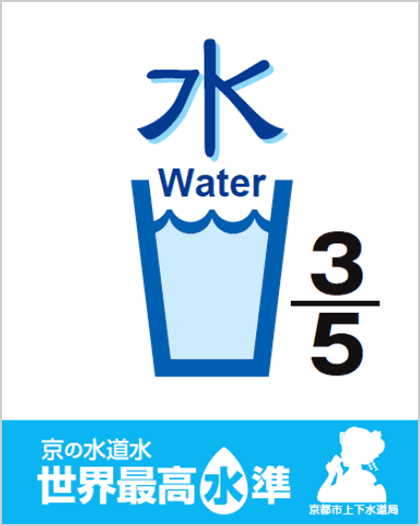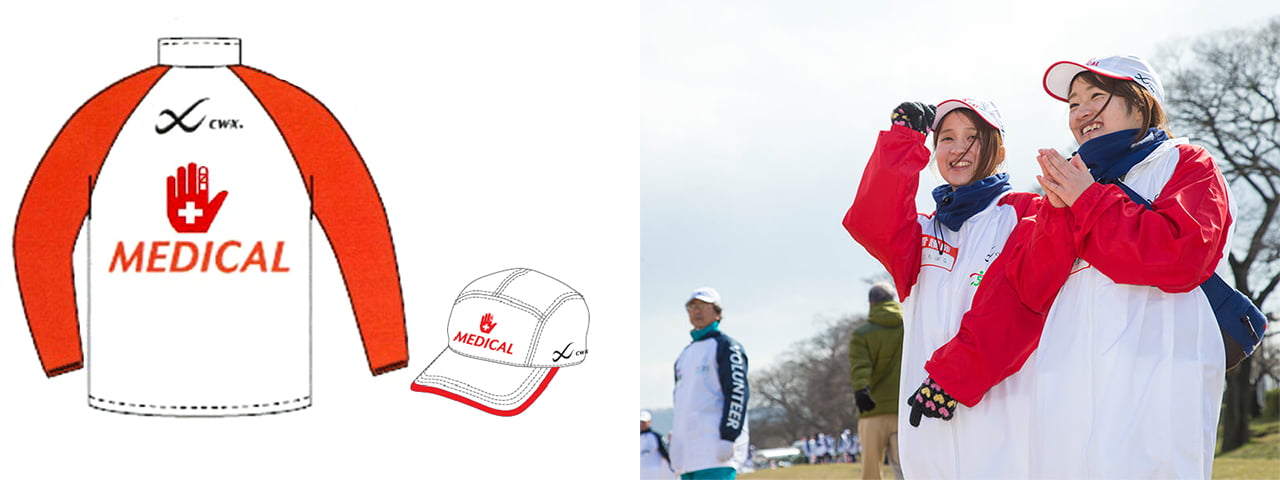Management of Your Physical Condition on the Day of the Race
Protecting Yourself from the Cold
The Kyoto Marathon will be held in fairly cold weather, which could possibly lead to hypothermia. Please take full measures for protection against the cold when participating in the race.
Apparel
- - Please make use of the “Multi-way cover” commemorative gift as a neck warmer or headband.
- - Arm warmers, long tights, and other articles of clothing are also very good for warding off the cold.
- - For T-shirts (long-sleeved shirts, etc.), we recommend those made of polyester or other kinds of material that dry quickly. Avoid cotton T-shirts, which absorb perspiration and are slow to dry.
Poncho and transparent garbage bag
A transparent poncho or a transparent garbage bag (approximately 45 liters in size) with holes opened for your head and arms provide excellent protection against the cold and is convenient because it keeps your race bib visible. If you decide to discard it during the race, please throw it into a refuse bin placed along the course or other locations.
Collection of clothing for protection against the cold at the starting area
To protect yourself from the cold until the starting gun goes off, you may wear a sweater, jacket, or other clothing that you no longer need.
- - This clothing will be collected for reuse/recycling, and will not be returned to you after the race.
- - After the gun goes off for the wheelchair race, please take the clothing to the designated collection area or hand it to staff members holding bags for collection. (Clothing will not be collected during the starting ceremony.)
- - Do not discard refuse into a clothing collection box.
- - Make sure that your race bib can be seen at the AD Check Gate (where bib numbers are checked) and entrance to the participation block.
Hot cream
To protect against the cold, it is also effective to rub hot cream with warmth-preserving action on the femoral region (front part of the thigh), back, upper arms, calves, etc.
- About hypothermia
- "Hypothermia" is a condition in which the body's core temperature (e.g., rectal temperature) drops below 35 degrees centigrade. Hypothermia does not occur while burning energy as you run. However, the risk of hypothermia may occur if your "internal combustion engine" declines in activity when your pace drops or the energy you need to burn becomes depleted.
- Weather Data for February 17 over the Last Five Years(based on weather observation data from the Japan Meteorological Agency)

Water supply measure
While running, because you lose fluids due to perspiration or other factors, it is indispensable to consume an adequate amount of fluids. You will become slightly dehydrated if you remain thirsty. Be sure to replenish your body’s fluids at each water station.
Water stations
Along the Kyoto Marathon course, water stations are set up at intervals of 5 km, where water or sports drinks in paper cups are available at multiple tables. At water stations, each table displays a sign--for example, a sign with “3/5” written on it- meaning the third table for water out of a total of five tables that have been prepared at the water station (the sign below is from Kyoto Marathon 2018).
In general if runners to pick up cups of water from the tables further back then there might be a tendency for less crowding.
Please do not rush but give yourself adequate time to replenish your body's fluids.

First Aid
Medical Aid Staff
Medical aid staff members wear the type of uniform described below. When you need the help from medical aid staff members, such as if you start to feel unwell or if see any other runner who looks or feels unwell, please call any staff member wearing this type of clothing.

Cold Sprays, Taping, and Other Treatments
Medical aid services at the Kyoto Marathon will be set up with an emphasis on saving lives. Aid for injuries and illnesses during the race will focus on emergency measures only. The staff will concentrate on ensuring treatment of people suffering from serious conditions. The aid station, therefore, will not be equipped for taping up runners, applying plasters, or spraying cold sprays. If necessary, please make provisions yourself.






















